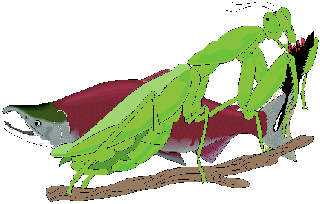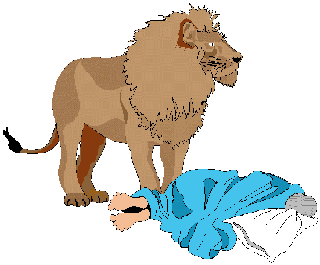The four-answer mandate for 'why' questions applies in many realms, but especially in biology. I like my example better: Why does sex feel good? Be advised, I have a scientific reason for my preference. Now, all four answers run parallel to those for the sugar question; however, there is an important distinction to be drawn: Whereas selecting a sweet-tasting substance affords survival value directly to the individual, the pleasures of sex do not. You might want to read the previous sentence again.In fact, while actually engaged in (I'll use scientific terminology here) chugga chugga kablowie, individuals are decidedly vulnerable to environmental dangers. Sure feels good, though. The key to the matter, naturally, is
that act of fertilization is mighty important for
assuring the perpetuation of genes --
fulfilling thereby the Purpose
of Life.
Individuals are altogether vulnerable to environmental hazards while slumbering, too. Sleep, like sex, must confer some kind of powerful fitness indeed to offset the risk. Sleep is when old men do their snoring, but we are not ready to consider our title question just yet. Life Styles of the PrehistoricThere was plenty of environmental stress outside the Garden of Eden. Let us remind ourselves of what life must have been like for primates, including humans, a few million years ago (or several thousand years ago, if you happen to prefer Bishop Usher's calendar). You were lucky to make it to forty, some say. If your offspring were to prove their reproductive competence, they had to get an early start.Security for offspring was a top priority -- especially the young female. Her precious uterus is essential for perpetuation of genes. Males were called upon to provide the protection from -- if necessary nourishment for -- predators. Risky business, that. And those guys back then did all that hunting, too, equipped with flimsy weapons. With their propensity for squirting sperms by the gazillions, though, males were expendable. So much so that guy-things included jousting for mates and warfare for territory -- both giving increased evidence for what I said earlier: that sex does not directly benefit the individual, survivalwise. The previous sentence could probably use an exclamation point. At this point we must take notice of an exceptionally subtle feature of the predator-prey relationship -- a most sophisticated aspect of nature... The Predator-Prey Contract There can be no doubt that predators benefit from eating prey. (Are we on the same page here?) Well, the opposite is also true. Partly true. Get this: Prey benefit from being eaten by predators. Not as individuals, for crying out loud -- and unlike sex, it does not feel good, either. But all that matters is that the prey's genes benefit. Take wildebeests. As a species intent upon propagating genes, wildebeests can achieve that outcome best if certain individuals get gulped by neighborhood lions. Not all -- some. Otherwise, you get a population explosion followed by an environmental crash. So much for perpetuating wildebeest genes. Less robust animals like those infirmed by disease or other defects -- they would be the preferred individuals for donation to the lion's table. Many have exactly the genes that neither God nor nature would want showing up in the next generation. Others are weakened by age, which means they have already done their gene thing. Whatever the affliction of the individual, by the way, better that they not run too fast. The faster the chase, the sooner the next chase. The idea is to minimize energy expenditure of the predator (nature often behaves as if it has 'ideas' -- kind of like God). That means fewer prey given up out of a wildebeest population in the long run because of -- well, the short run (for the lions). An ironic collaboration, therefore, exists between predators and prey. Not always a happy deal, but the result is balance in the environment -- more important, increased fitness for both 'partners' in succeeding generations. We're talking sophistication, here. Back in those days, gender asymmetry was not a subject for debate. Neither was age discrimination. Accordingly, if young males were less valuable than females, what about old males? We are getting closer to the snoring question. It is old men who put out the most Zs. No question about it: Even today, the vast majority of old men snore. And fat ones do the loudest job of it. Old women don't snore all that much.
If our reasoning is valid, snoring attracted predators. It would not have taken them long to learn that here was an easy meal -- easier than chasing wildebeests in the daytime, anyway. But for us and our genetic imperative, that was cool. Heck, the old guy had long since cut down on his hunting. He had already done his part in reproduction, too -- passing along his snorability genes, let us not forget. As a drain on scarce resources, the snoring old man would be the best choice -- all right, least worst choice -- for his own species to give up, in collaboration with predators. Better him than children or young females -- or, apparently, the old woman sleeping quietly next to him in the cave. The old woman seems not to have been selected for nighttime sacrifice -- probably because she had a different role to play late in life: assisting mothers in nurturing grandchildren, say. We might suppose that she watched over the tykes in the daytime while their mothers did the gathering. Being not so swift in flight, however, old women would have been selectively ingested by those predators which hunt by daylight and therefore without the need of an auditory invitation. Meanwhile, a typical old man with floppy glottis got up in the morning after a night of seismic snoring, and performed his own daytime duty, perhaps tagging along with the young males -- to serve as lookout. Or as bait.
Excerpted from The American Heritage Dictionary of the English Language
|

 e have,
finally, the phylogenetic answer. God really
did a number on old men, some will say. Either that or
natural selection was operating. Evolutionists
postulate two variations of humans that appeared long
ago ('mutations' may be a term to your liking). One
carried the requisite genes for the development of the
snoring ability in old men and the other did not. We
know which one got here. By the billions. The
snoring trait must have bred true and conferred a
differential advantage in the earliest generations.
e have,
finally, the phylogenetic answer. God really
did a number on old men, some will say. Either that or
natural selection was operating. Evolutionists
postulate two variations of humans that appeared long
ago ('mutations' may be a term to your liking). One
carried the requisite genes for the development of the
snoring ability in old men and the other did not. We
know which one got here. By the billions. The
snoring trait must have bred true and conferred a
differential advantage in the earliest generations.
 In
either
case, hanging around with a gang of hunters, the
codger would have enjoyed some protection from
the hazards of the hunt -- at least enough to reach
base camp for his nocturnal snoring assignment.
In
either
case, hanging around with a gang of hunters, the
codger would have enjoyed some protection from
the hazards of the hunt -- at least enough to reach
base camp for his nocturnal snoring assignment.